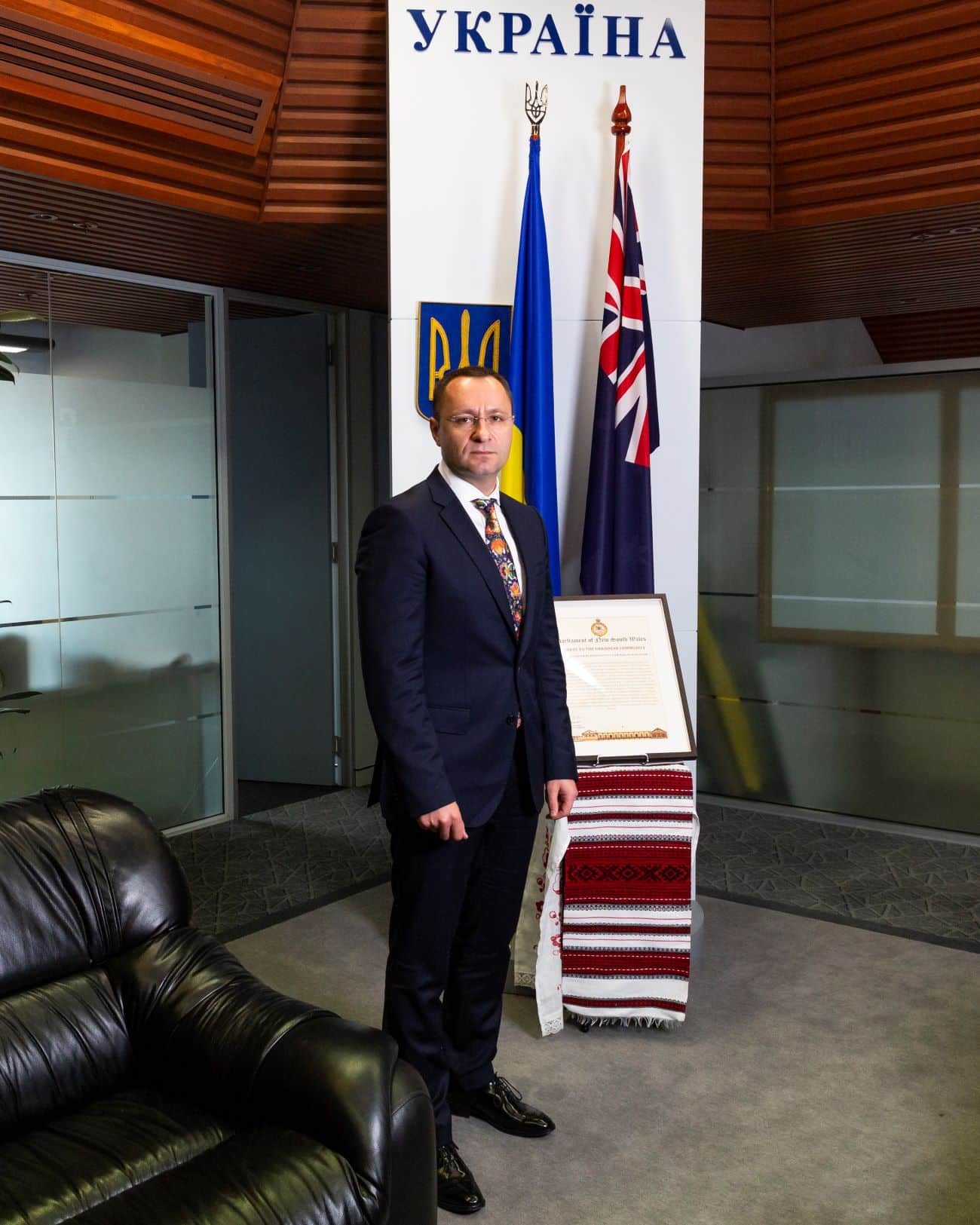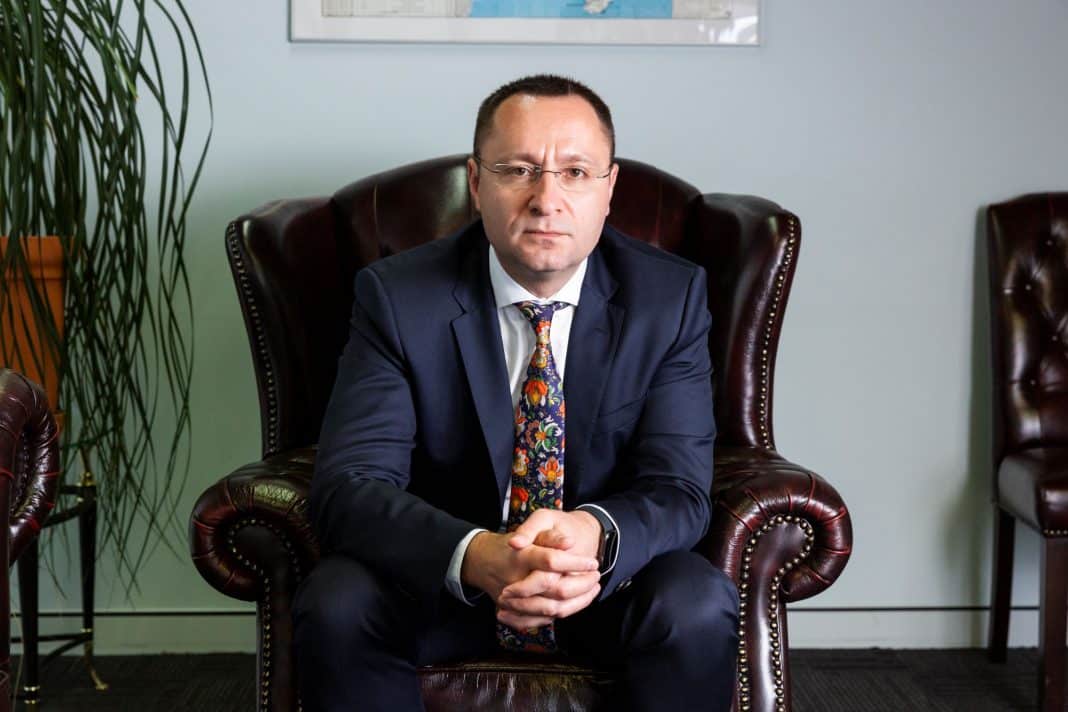Ukrainian Ambassador to Australia Vasyl Myroshnychenko recently returned to Australia from his homeland after attending the annual Ukrainian Conference of Ambassadors in December 2022.
Mr Myroshnychenko’s return to Ukraine amidst the illegal Russian invasion pertained to furthering Australia’s relations with Ukraine and attending briefings with Ukrainian officials, including President Volodymyr Zelenskyy.
Annual Conference of Ambassadors
Mr Myroshnychenko said it was important to reunite with his contacts and meet with President Zelenskyy along with other senior government representatives at the annual conference.
A number of Ukrainian ambassadors hadn’t travelled to Ukraine since the outbreak of the war and Mr Myroshnychenko said it was “good that they could reconnect with the country”.
“In my case, it was different; I mentioned I was still in Ukraine when the war started, so it was different,” he said.
Ambassadors from around the world gathered in Kyiv before travelling to Mykolayiv to engage with locals, the regional government, and the military.
“Mykolayiv is just only 90 kilometres from Kherson, so we were out there, actually it was the 24th of December when we were there, and just that day Russians had attacked Kherson and around 50 people got either killed or injured,” Mr Myroshnychenko said.
He was pleased to see President Zelenskyy, who had just landed from his trip to Washington DC, which Mr Myroshnychenko described as a “historic trip”. He said it was an “honour” to meet with him the very next day.
Additionally, the congregation of ambassadors met with Ukrainian Prime Minister Denys Shmyhal, Minister of Defence Oleksii Reznikov, and Minister of Energy German Galushchenko, who briefed the diplomats on Ukraine’s recovery and reconstruction plan, and infrastructure damage.
The Ukrainian First Lady, Olena Zelenska, also gave an address, giving an update on her charity which raises money from international businesses to help Ukrainians in need.
Three foreign dignitaries were ‘guests of honour’ at the conference: US Secretary of State Antony Blinken, Japan’s Minister of Foreign Affairs Yoshimasa Hayashi, and Kenya’s Minister of Foreign Affairs Alfred Mutua, along with a number of security agencies.
According to Mr Myroshnychenko, overall, Ukrainian ambassadors working in countries across the world are “very motivated, united”.
Pushing for conditions of peace
President Zelenskyy presented his 10-point peace plan during the G20 summit on 15 November 2022.
The 10 conditions include radiation and nuclear safety, food security, energy security, the release of all prisoners and deportees, restoration of Ukraine’s territorial integrity, withdrawal of Russian troops and the restoration of Ukraine’s state border with Russia, justice, prevention of ecocide, prevention of conflict escalation, and a confirmation of the war’s end.
Mr Myroshnychenko said all Ukraine’s conditions “should be achieved” and are “necessary for the peace of Ukraine”.
He reiterated to Canberra Daily the importance of Australia’s support of the plan and urged the Australian Government to attend the Ukrainian summit in New York, expected to be held on 24 February, to display their solidarity.

Australian and New Zealand support
Australia, along with New Zealand, have been invited to join the Ukrainian summit in New York and assist in making the conditions of peace become a reality.
Mr Myroshnychenko praised New Zealand for their support and said the two countries have a “very good relationship”. He recently returned from a diplomatic trip to New Zealand to meet with Minister of Defence Peeni Henare, Minister of Foreign Affairs Nanaia Mahuta, and a number of members of parliament.
He said he hopes Australia will continue supporting Ukraine and step up their military assistance, including supplying additional Bushmasters, army personnel carriers, ammunition, and telecommunications equipment.
Australia’s investment in Ukraine will assist in solidifying global and regional security, he said.
Mr Myroshnychenko plans to further strengthen the Ukrainian-Australian relationship to “a new level”.
“We have already achieved a lot in the last year with all the assistance we’ve been provided, support for which myself and everybody’s very thankful for, and of course, a historic visit of Prime Minister Albanese to Ukraine,” he said.
In the 11 months since the war began in February 2022, Australia has already contributed $655 million to support humanitarian and military efforts in Ukraine, including 90 Bushmaster armoured vehicles.
Following Canberra Daily’s interview with the Ukrainian Ambassador, the Australian Federal Government announced the commencement of Operation Kudu – a contingent of around 70 Australian troops who will join a United Kingdom-led mission training Ukrainian citizen soldiers. Mr Myroshnychenko said he “welcomed the decision” in a statement on Twitter.
Throughout 2023, Mr Myroshnychenko is looking forward to contributing to an increase in parliamentary delegations between Australia and Ukraine and is confident “a lot can be achieved”.
He emphasised the need for Australia to back Ukraine’s recovery in both the public and private side of operations.
Additionally, Mr Myroshnychenko spoke of the USA supplying Ukraine with Patriot air defence missile systems, saying “that was quite special, I would say”.
Christmas in Ukraine: mistletoe and missiles
The Conference of Ambassadors coincided with Christmas, so Mr Myroshnychenko was in Ukraine for the holiday.
In an act of defiance, Ukraine chose to celebrate Christmas on 25 December rather than their usual date of 7 January – the day the Russian Orthodox Church celebrates.
Mr Myroshnychenko said the new tradition will take some time before it’s nationally adopted, but there was a festive spirit in Kyiv despite the ongoing warfare.
“So when I came to Kyiv in the morning, I heard carol songs and Christmas songs at a train station, the main train station of Kyiv,” he recalled.
“So it gives you kind of this festive season in the air and then you see Russian missiles coming into the city the next day and you have a different perspective.”
Ukraine’s festive season was overshadowed by the devastation of war, “but that’s kind of the reality,” Mr Myroshnychenko said.
“All throughout Christmas, we’re thinking about our soldiers who are fighting there in the trenches and who don’t have any food, who don’t have any basic stuff and who are there defending Ukraine, helping us and civilians to have a Christmas, and that was kind of the feeling and the sentiment which is felt pretty much throughout the country wherever I went, wherever I talked,” he said.
“So, it was all about our soldiers defending the country.”
Mr Myroshnychenko also told Canberra Daily that during his visit back home, the university he attended between 1998 and 2003, Taras Shevchenko National University of Kyiv, was targeted by a Russian missile attack on 31 December 2022 – New Year’s Eve.
He said the windows exploded and there’s serious damage to the building, but despite the destruction, “the city tries to live like normal”.
Personally, Mr Myroshnychenko was able to visit his home, enjoy a cup of coffee from his coffee machine, catch up with friends, and visit his parents in Western Ukraine.
Hopes for 2023
A self-proclaimed optimist, Mr Myroshnychenko’s 2023 wish list contains the necessities Ukraine requires to win Russia’s illegal war: tanks, long-range missiles, and additional military equipment so they can drive Russia out of their country and “stop the bloodshed”.
Get all the latest Canberra news, sport, entertainment, lifestyle, competitions and more delivered straight to your inbox with the Canberra Daily Daily Newsletter. Sign up here.



